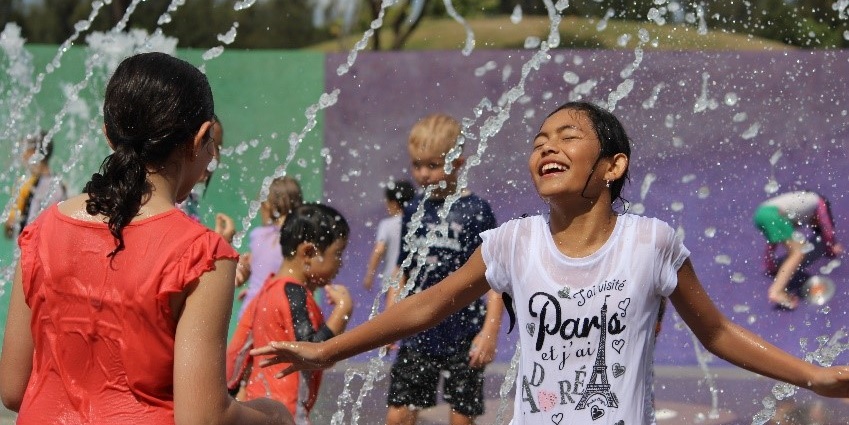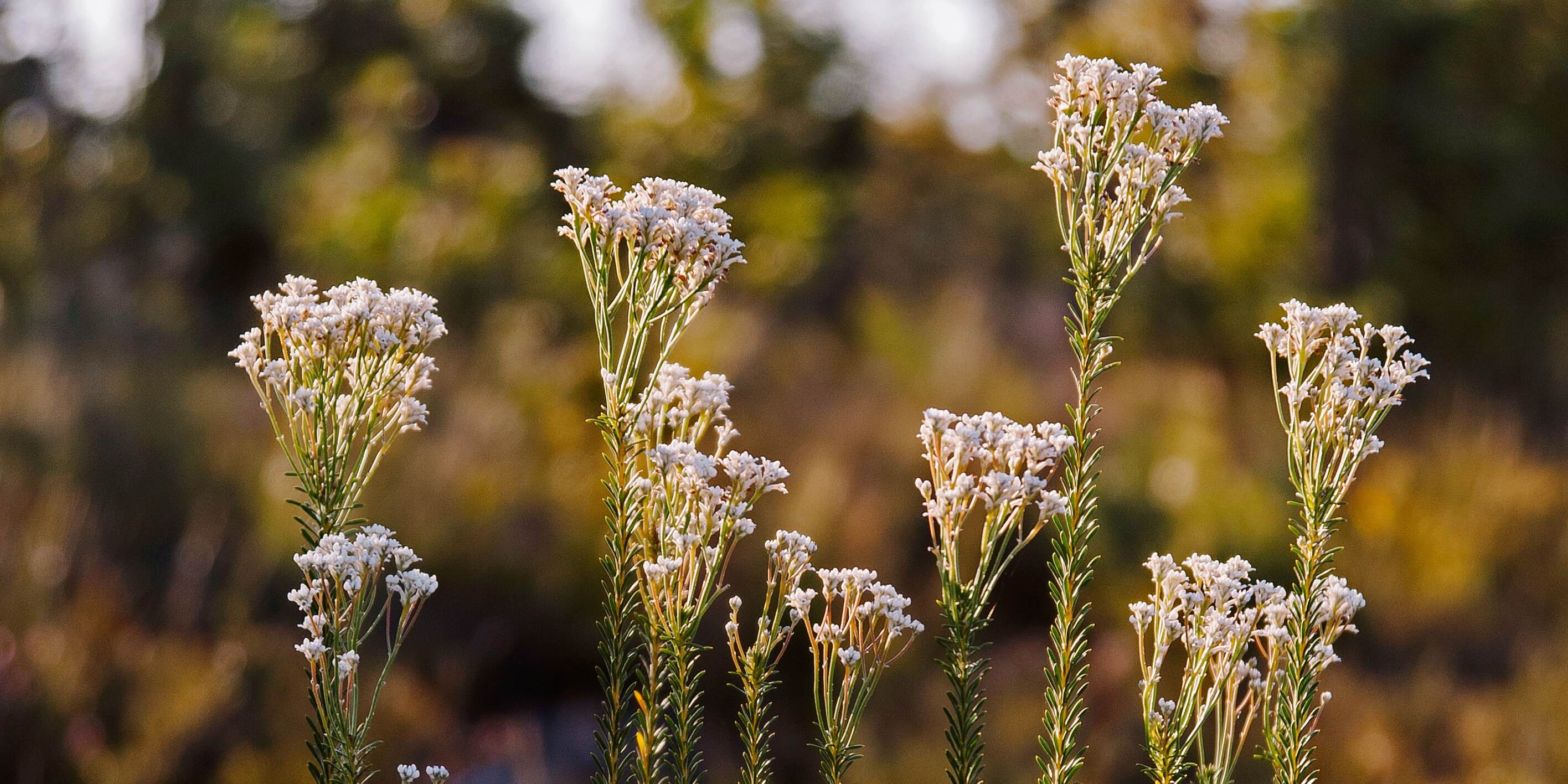Every year, the NSW Government’s AdaptNSW Forum and webinars connect a diverse range of people with information that enables them to take action to be resilient to the impacts of climate change.
The 2021 AdaptNSW webinar, Adaptation in action: heat risks and opportunities in your local government area, attracted over 300 people, not only from local councils but from a broad group of people interested in managing the impacts of extreme heat and heatwaves.
The webinar showcased examples of the NSW Government’s innovative Increasing Resilience to Climate Change grant projects, curated by Local Government NSW. Speakers from a range of NSW councils talked about actions their councils are taking to build resilience to the impacts of extreme heat in their communities. Practical tools, challenges and lessons learned were presented with video case studies.
Some of these inspirational stories showcased regional councils adapting remote town halls for community refuge during heatwaves; to upgrades to showgrounds to increase animal welfare and attract new events and business; and future climate-ready revegetation plantings to increase cooling.
The widespread interest in this work demonstrates a strong desire for climate information that supports better adaptation to climate change.
The Increasing Resilience to Climate Change grants are delivered in partnership with Local Government NSW and funded by the NSW Government.
Esther Bailey - NSW Department of Planning and Environment, Director, Climate Resilience and Net Zero Emission
In this introduction, Esther provides an overview of the IPCC Assessment Report 6 and what it means for NSW local councils. She shares the Climate Change Integrated Planning and Reporting (IP&R) Package, developed by the Hunter JO, which is a practical tool to support councils incorporate climate change considerations in the IP&R Framework. Finally, Esther outlines the Increasing Resilience to Climate Change grants for councils and how they support local communities across NSW to increase their resilience and reduce heat related impacts from climate change.
Related resources
AdaptNSW Newsletter Registration Page
Increasing Resilience to Climate Change grant case studies
Judith Bruinsma - Project Coordinator, Western Sydney Regional Organisation of Councils (WSROC)
WSROC has been building adaptive capacity to heat in Western Sydney through the Cool Suburbs pilot project with Resilient Sydney. This project is designed to build the capacity of government, developers, and the community to take action to mitigate urban heat. In this webinar, Judith and Mark Siebentritt demonstrate the Cool Suburbs rating tool and share ways that other councils can use the tool to integrate urban heat considerations into planning policies and guidelines.
Related resources
Turn Down the Heat Strategy - Co-designed by over 55 stakeholders who recognise that the response to extreme heat and heatwaves is a shared responsibility. This is a collaborative, multi-sector approach to building a cooler, more resilient future for Western Sydney. WSROC is currently delivering four grant-funded projects under the Turn Down the Heat Strategy.
Urban Heat Planning Toolkit (2020 – 2021) - Developed to help local government strengthen their planning provisions to reduce the impacts of heat. The toolkit focuses on strategies that can be implemented in new development and redevelopment, to reduce urban heat and help people adapt. While the focus is local government and land use planning, the first two parts of the toolkit will have broad relevance to a wider audience (incl explanation of the resilience framework).
Cool Suburbs Tool (2020 – 2021) - This initiative has developed a design guidance and decision support tool for industry and government. It provides guidance on how to address heat through better urban design practices for different development scales (from large neighbourhoods, down to individual lots). The tool can be used by industry to promote best practice, or by governments to inform policy, guidance and planning instruments. This work was informed by a comprehensive science translation, done through partnership with four universities.
Heat Smart Western Sydney (2020 – 2021) - Heat Smart Western Sydney looks at what processes and structures are needed for the city to respond to extreme and emergency events with a focus on how we can support our most vulnerable. By assessing our current approach to heatwave management, Heat Smart seeks to co-design a Heatwave Resilience Framework that outlines an improved approach to heatwave management.
Climate resilient street trees (2020 – 2022) - This project will establish street tree demonstration sites across the Penrith and Blacktown Local Government Areas. A selection of species with varied climate-risk and cooling benefits will be planted with and without access to stormwater in passive irrigation storage pits.
To ensure vulnerable communities and frontline staff have the knowledge and tools needed to successfully manage heat risks, this project has also developed a range of resources for communities and organisations and is currently delivering a series of workshops.
Robert Hughes - Business Manager Community Facilities, Goulburn Mulwaree Council
Showgrounds are a focal point in regional communities for bringing people together from around the region for events and festivities. Understanding how they will be affected by high temperatures and how we can protect organisers, volunteers, patrons and animals from heat stress and dehydration is imperative. In this webinar, Robert shares findings from the Heat Smart Showgrounds project to highlight ways for councils to identify showgrounds that are most affected by high temperatures and implement priority improvements and procedures to protect against heat stress.
Related resources
Heat proofing Strategies to Protect Communities video
Goulburn Mulwaree Council - Goulburn Recreation Area - This website provides background information on the recreation area as well as a link to the Goulburn Recreation Area Crown Reserve Plan of Management. This plan outlines how the Heat Smart Showgrounds, Goulburn Recreation Area Climate Change Resilience Study August 2020 supported the recommended actions in the Plan of Management through the identification of a suite of priority actions to improve the resilience of the GRA.
Michael Fiedler - Environmental Management Officer, Bega Valley Shire Council
Community halls in regional communities can be adapted to provide heat refuges to local residents on extreme heat days. Through the Cooler Places for a Warmer climate project, Bega Valley Shire upgraded three halls in remote communities to be more climate resilient and developed resources for residents on keeping safe on extreme heat days and how to use the halls as refuges. In this webinar, Michael outlines the specific measures implemented at the community halls that could be applied by other NSW councils.
Related resources
Cooler places in a warmer climate – Bega Valley Shire Council
This website provides a project summary and background, purpose, connection to Council’s Community Strategic Plan, FAQs, project timeline, council contact details, and a link to the Council’s Climate Resilience Strategy.
Please contact the Environment and Sustainability Team on 02 6499 2222 to request a copy of the Cooler Places in a Warmer Climate – Community Consultation Report and the Technical Brief Document – Bega Valley Community Centres Supply and Installation of Solar PV and Battery Storage with Backup.
Sarah Horan - Senior Project Planner, City of Newcastle
Reducing heat stress in public outdoor spaces will increase community place-making in urban local centres. Developed in partnership with the University of Newcastle and the local community, the Beresfield Placemaking and Climate Resilience project demonstrates how innovative design solutions such as rain gardens, appropriate material selection and different types of shade can be used for future urban renewal projects.
Related resources
Beresfield Adaptive Place Making video
Beresfield Local Centre - This website provides background details on the project including features, placemaking activities, and links to Smart Trees: Resilience Strategies to Combat Urban Heat Island Effect (PDF) and Beresfield Local Centre: Urban Heat Measurement Report (PDF).
Beresfield: Bring this space to life - This website provides background information on the community consultation process, including concept plans, engagement summary reports, and the project timeline.
Please contact Sarah Horan ([email protected]), Senior Project Planner, City of Newcastle for more information on project delivery and the placemaking process as well as for copies of the following documents:
- The Beresfield Placemaking Flow Chart
- Beresfield Placemaking shade shelter construction details
- The Smart Trees report (contains temperature measurements and materials palette developed by the University of Newcastle)
- Time lapse of the artists painting the wall mural
Cameron Pensini - Sustainability Project Officer, Queanbeyan-Palerang Regional Council
Urban forest planning can influence the lives of residents by reducing storm water runoff, decreasing wildfire risks and severity, and reducing urban heat islands. In this webinar, Cameron shares findings from the Keeping it Cool – Vegetation and Heat Adaptation Strategy project. This includes considerations for other regional councils when preparing an urban forest strategy and developing guidelines for planting programs.
Related resources
Keeping it Cool – Vegetation and Heat Adaptation Strategy - This website includes a summary of the project as well as a link to the Surface heat Mapping report (PDF).
Further resources (Urban Forest Cooling Strategy / Vulnerability Assessments) will be available on the council website in 2022.
Discussion regarding dark and light roofs
Discussion regarding shade’s significant role in reducing exposure to UV radiation, which is the leading cause of skin cancer
Cancer Council’s Shade and UV protection
Cancer institute NSW - Why is shade important for UV protection?
Cancer Council’s Guidelines to Shade – a comprehensive reference for planning and designing good quality built and natural shade:
Cancer Council NSW page regarding shade, which also contains case studies
Beyond Zero Emissions (BZE) developed the book Cooling Your Home with IRCC community grant funding in 2020 and includes new research to help residents survive heatwaves.



